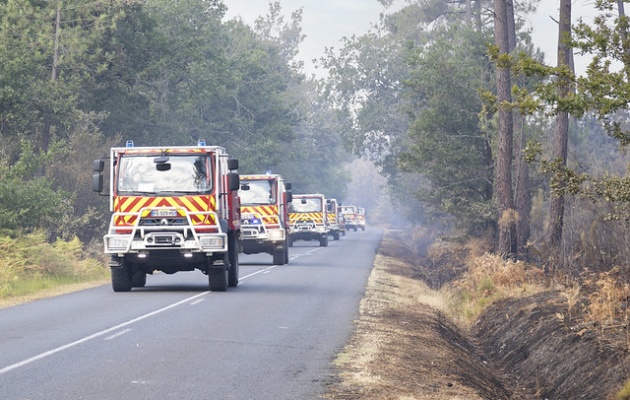In France, the destruction of forest fires was seven times the annual average. Christian environmentalists warn against responding to the crisis with “self-defeating views”.
![Firefighters in France working in a forest, summer 2022. / Photo: [link]EU Civil Protection Humanitarian Aid[/link], Flickr, CC](https://cms.evangelicalfocus.com/upload/imagenes/630f5b565aeab_52294222061_36b163e8a9_kCropped.jpg) Firefighters in France working in a forest, summer 2022. / Photo: [link]EU Civil Protection Humanitarian Aid[/link], Flickr, CC
Firefighters in France working in a forest, summer 2022. / Photo: [link]EU Civil Protection Humanitarian Aid[/link], Flickr, CC
France has suffered the worst forest fires it remembers. French newspaper Le Monde summarised them as “blazes of unusual intensity, speed, and duration, burning record surface areas”.
The statistics of the year 2022 are staggering. As of 20 August, 62,903 hectares (629 square kilometres) had been burnt, a figure that is 7.3 times higher than the average of the last fifteen years.
In addition to the usual fires in the Mediterranean regions (southeast), highly destructive fires also destroyed large areas in the Western Atlantic region. The so-called “megafire” in the Gironde department burnt over 26,600 hectares.
[destacate]“It’s not easy to be dismissive about 50,000 hectares of woodland alight”[/destacate]So far this year, one quarter of France’s departments have seen fires ten times more destructive than usual, with regions like Var and Pyrénées-Orientales suffering much. Usually unaffected areas such as the Jura (Alps) also were surprised by the flames.
According to the European Forest Fire Information System (EFFIS), the nine fires destroying over 1,000 hectares each in France so far this year already smashed the record of five such fires of 2017. Some of these blazes were caused by criminal actions of humans, many others not.
So, what are the consequences in the mid and long term? What should be done to see a change for good? Evangelical Focus contacted the Christian conservationist group A Rocha France. Its board member Chris Walley responded to some of these questions.

[photo_footer] Chris Valley, member of the A Rocha France board. [/photo_footer] Question. How have the French people reacted to the forest fires this summer?
Answer. People have been particularly alarmed by the fact that the fires have occurred well beyond their usual occurrence around the edges of the Mediterranean, reaching as far north as Brittany.
The fires have also been linked with a drought which is having a noticeable impact on river levels and crops, something that makes a major impact in a country that is still very agricultural. One of the few plus points of the fires is that it has made climate change both real and unarguable. It’s easy to dismiss changes in levels of an invisible gas of parts per million: it’s not easy to be dismissive about nearly 50,000 hectares of woodland alight.
[destacate]“There should be a sensible replanting of more varied, fire-resistant trees, more grasslands and even vineyards”[/destacate]Q. What are the impacts these fires have on both the territory and the people?
A. Human populations have been temporarily displaced but are now returning. There have been some property losses and there will be a long-term economic cost with the damage of commercial forests. A full assessment of the biological losses remains to be made but they must be severe.
Forests around the Mediterranean edge are to some extent adapted to fires as a natural phenomenon (for example the cork oak) and can recover. The situation with more northerly forests is more problematic, particularly with slow growing species like oaks. Some of the major fires were however in commercial woodland with often a single tree species with a low species diversity.
 Firefigthers working in France, summer 2022. / Photo: EU Civil Protection Humanitarian Aid
Firefigthers working in France, summer 2022. / Photo: EU Civil Protection Humanitarian Aid[photo_footer] Firefigthers working in France, summer 2022. / Photo: EU Civil Protection Humanitarian Aid [/photo_footer] Q. What would be a good response after this record-breaking summer? What should be done better?
A. The government has promised a serious response to the summer’s fires and it is to be hoped that this will be thoroughgoing and immune to pressure from commercial interests. Questions must be asked about the nature of the commercial forests with vast areas of densely packed trees with few breaks.
[destacate]“The involvement in environmental action is a splendid way of demonstrating the relevance of the gospel”[/destacate]These forests need to be redesigned and this can be done to the benefit of both people and nature. There should be a sensible replanting of more varied and more fire-resistant trees, more open areas, more grasslands and even vineyards (which are quite resistant to fire).
In particular, it would be good to see the creation of many new wetland areas which do not simply act as fire breaks but also as very effective stores for carbon. In order to aid the restoration of the burnt areas it would be good to see them surrounded by substantial protective zones in which, for a decade at least, wildlife was encouraged by the absolute minimum use of pesticides and herbicides and an end to bird hunting.
Q. How would you give a Christian view on the environmental crises we are suffering? How to better teach and raise awareness inside the church about these issues?
A. A particular problem in France is the assumption that, due to its size, the nation is in some way infinite and as such can handle unlimited damage. We need to adopt a wiser view where we are responsible for an area of limited size and considerable vulnerability. A very helpful biblical image here is that of the mandate to Adam to look after a garden.
Two further problems are that in management terms the issue is seen as too big for any satisfactory human response and the Christian temptation to consider that it’s God’s business to fix it. These are dangerously self-defeating views. Without neglecting evangelism, churches need to get involved in environmental action. In fact, their involvement in environmental action is a splendid way of demonstrating the reality and relevance of the gospel.
[donate]

Las opiniones vertidas por nuestros colaboradores se realizan a nivel personal, pudiendo coincidir o no con la postura de la dirección de Protestante Digital.
Si quieres comentar o